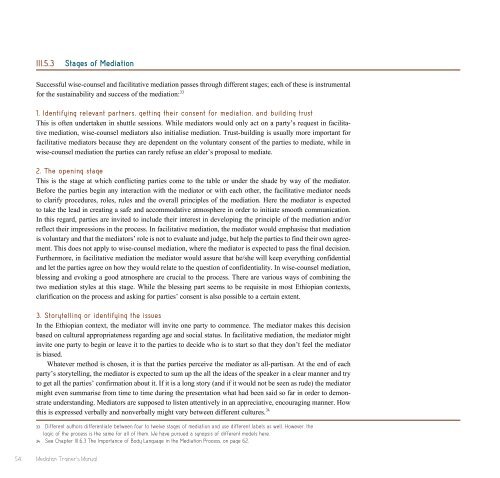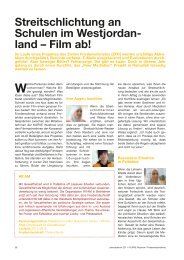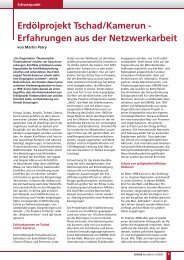Merging Ethiopian Wise-Counsel Mediation and Facilitative ...
Merging Ethiopian Wise-Counsel Mediation and Facilitative ...
Merging Ethiopian Wise-Counsel Mediation and Facilitative ...
- No tags were found...
Create successful ePaper yourself
Turn your PDF publications into a flip-book with our unique Google optimized e-Paper software.
III.5.3 Stages of <strong>Mediation</strong>Successful wise-counsel <strong>and</strong> facilitative mediation passes through different stages; each of these is instrumentalfor the sustainability <strong>and</strong> success of the mediation: 331. Identifying relevant partners, getting their consent for mediation, <strong>and</strong> building trustThis is often undertaken in shuttle sessions. While mediators would only act on a party’s request in facilitativemediation, wise-counsel mediators also initialise mediation. Trust-building is usually more important forfacilitative mediators because they are dependent on the voluntary consent of the parties to mediate, while inwise-counsel mediation the parties can rarely refuse an elder’s proposal to mediate.2. The opening stageThis is the stage at which conflicting parties come to the table or under the shade by way of the mediator.Before the parties begin any interaction with the mediator or with each other, the facilitative mediator needsto clarify procedures, roles, rules <strong>and</strong> the overall principles of the mediation. Here the mediator is expectedto take the lead in creating a safe <strong>and</strong> accommodative atmosphere in order to initiate smooth communication.In this regard, parties are invited to include their interest in developing the principle of the mediation <strong>and</strong>/orreflect their impressions in the process. In facilitative mediation, the mediator would emphasise that mediationis voluntary <strong>and</strong> that the mediators’ role is not to evaluate <strong>and</strong> judge, but help the parties to find their own agreement.This does not apply to wise-counsel mediation, where the mediator is expected to pass the final decision.Furthermore, in facilitative mediation the mediator would assure that he/she will keep everything confidential<strong>and</strong> let the parties agree on how they would relate to the question of confidentiality. In wise-counsel mediation,blessing <strong>and</strong> evoking a good atmosphere are crucial to the process. There are various ways of combining thetwo mediation styles at this stage. While the blessing part seems to be requisite in most <strong>Ethiopian</strong> contexts,clarification on the process <strong>and</strong> asking for parties’ consent is also possible to a certain extent.3. Storytelling or identifying the issuesIn the <strong>Ethiopian</strong> context, the mediator will invite one party to commence. The mediator makes this decisionbased on cultural appropriateness regarding age <strong>and</strong> social status. In facilitative mediation, the mediator mightinvite one party to begin or leave it to the parties to decide who is to start so that they don’t feel the mediatoris biased.Whatever method is chosen, it is that the parties perceive the mediator as all-partisan. At the end of eachparty’s storytelling, the mediator is expected to sum up the all the ideas of the speaker in a clear manner <strong>and</strong> tryto get all the parties’ confirmation about it. If it is a long story (<strong>and</strong> if it would not be seen as rude) the mediatormight even summarise from time to time during the presentation what had been said so far in order to demonstrateunderst<strong>and</strong>ing. Mediators are supposed to listen attentively in an appreciative, encouraging manner. Howthis is expressed verbally <strong>and</strong> nonverbally might vary between different cultures. 3433 Different authors differentiate between four to twelve stages of mediation <strong>and</strong> use different labels as well. However, thelogic of the process is the same for all of them. We have pursued a synopsis of different models here.34 See Chapter III.6.3 The Importance of Body Language in the <strong>Mediation</strong> Process, on page 62.54 <strong>Mediation</strong> Trainer’s Manual
















